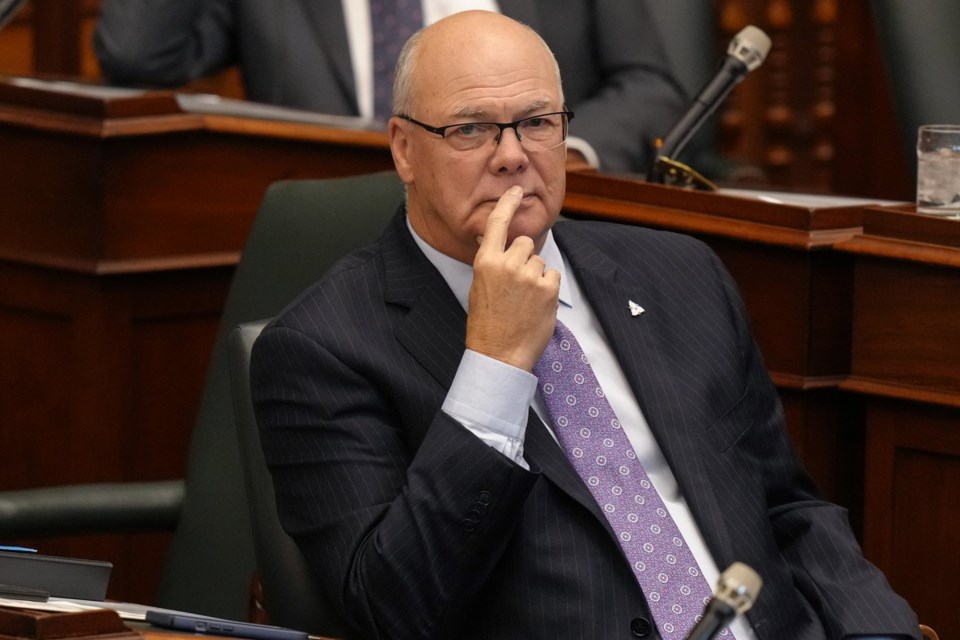TORONTO — Ontario's housing minister introduced legislation Monday intended to speed up the construction of new homes, as he admitted the province isn't currently on track to meet its goal of getting 1.5 million homes built over 10 years.
Municipal Affairs and Housing Minister Rob Flack said the target has not been forgotten, but conceded there are challenges.
"We've got some pretty strong headwinds," he said at a press conference to announce his bill.
"It's a goal. But frankly, I'm focused more on — and our team is focused on — the next 12 to 24 months, because if it stays the way it is now, we'll never get there. We have to make immediate changes."
Data published recently by the Canada Mortgage and Housing Corporation showed that housing starts in Ontario in March were down 46 per cent, year over year, for communities with 10,000 or more people.
Flack's bill would reduce the scope and number of studies municipalities can require for new developments, speed up certain minor variances and standardize and streamline fees developers pay that municipalities use to fund housing-enabling infrastructure such as water and sewer lines.
As well, it would allow municipalities to more easily reduce development charges, allow residential builders to pay those fees at the time of occupancy instead of when a permit is issued, and exempt long-term care homes from the fees in order to spur their development.
Scott Andison, CEO of the Ontario Home Builders' Association, said that when the province's municipalities all have potentially different application and development charge requirements, it slows down the home building process.
"In the absence of a common application process, builders must retool their application process in response to potentially 444 different application requirements and navigate significantly different pathways to get to a single goal — approval to build or renovate a home needed by Ontario families," he said.
The bill would also extend the power for granting Minister's Zoning Orders, which override municipal bylaws, beyond the municipal affairs and housing minister to include the minister of infrastructure when it comes to transit-oriented communities.
It is a tool the province's auditor general has raised concerns with in the past, noting that the province's process for MZOs can give the appearance of preferential treatment for some requests. The Progressive Conservative government used MZOs 114 times from 2019 to 2023, which is a 17-fold increase in usage from the previous 20 years, the auditor found.
Liberal Leader Bonnie Crombie said the use of MZOs should be curtailed, not expanded.
"You don't need another minister's hands in the Ministerial Zoning Orders," she said.
"We've seen this government's track record, and we've seen the abuse that there can be, and this is just yet another opportunity by broadening the power and increasing the number of ministers who can now issue MZOs. This is a really huge concern."
Infrastructure Minister Kinga Surma said the move will help get more housing built.
"We're just trying to be more efficient, but we'll also continue working with the hard working (Ministry of Municipal Affairs and Housing) staff," she said.
"We want to be flexible. We want to be nimble. I have MZOs that I'd like to issue this year."
The bill would also cap the number of affordable units a municipality can require in certain residential developments at five per cent in order to make projects more viable, but Crombie said it would lead to a reduction in the availability of affordable housing.
As well, the bill would standardize construction requirements and provide clarity that municipalities can't create construction standards beyond the building code. Developers and builders have expressed frustration at municipalities that create additional requirements, such as Toronto's green building standard.
“At a time when there are so many challenges facing the residential construction industry, these changes are necessary and essential as they will simplify the approvals process and make the homebuilding process more efficient,” Richard Lyall, president of the Residential Construction Council of Ontario, said of the bill as a whole.
The government also announced Monday that it will add $400 million to two funds municipalities use to build housing-enabling infrastructure.
This report by The Canadian Press was first published May 12, 2025.
Allison Jones, The Canadian Press




